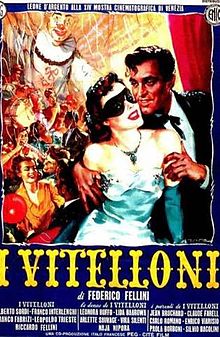
This one is only the second Federico Fellini film I’ve written about in this blog and like La Strada dates from the earliest part of the career of the great director. I was curious about what the Italian title actually meant and so tried to search for a translation. As it turned out, the title is incomprehensible even to Italians as it is either a little known street slang term that Fellini heard when he was young or a portmanteau of other words. Today it is generally agreed to refer to a certain class of parasitic and aimless youths who spend their days in idleness.
That’s exactly what this film is about even if it sometimes feels otherwise. Set in an unnamed provincial town, it tells the story of five young men who all fit this mold. Unfortunately it does spend most of its time focusing on one of them in particular, the playboy Fausto who is forced to marry local beauty Sandra when she becomes pregnant. The other members of their gang include Leopoldo who fancies himself a playwright but spends his nights flirting with the neighbor’s maid; Alberto, an effeminate man who relies on his sister and his mother; and Moraldo, Sandra’s brother who is the most introspective of them all.
I say that’s unfortunate because the film is at its best when it’s about the group of friends as a whole but the special focus on Fausto makes it instead feel like a tiresome love story. Fellini does at least execute the character’s story arc perfectly and the actor Franco Fabrizi is as slimy as you can imagine but as my wife notes, this part of the story ends on an unsatisfying trite note. It’s still delightful to see how the other characters are wise to Fausto’s intentions and that he isn’t quite the smooth charmer that he thinks he is. I especially enjoyed how the shopkeeper played by Carlo Romano telling him that he pities him as someone who does not know love and how he volunteers to shake the hand of Fausto’s father when he beats the stuffing out of him.
The film’s best but all too brief scenes are when the group are gathered together doing nothing but wandering the streets. Those scenes capture a sharp sense of restlessness and enforced idleness. The group seems to take a certain sort of perverted pride in not doing anything productive, so much so that when Fausto is forced to work as a shop assistant his friends come to mock him at the shop window as if he were a tamed animal and Moraldo is shocked to meet a young boy who works at the railway station. I read that this film has strongly influenced many other coming-of-age films and I’m guessing that it is precisely this quality that they seek to capture and emulate.
Interestingly, I note that while youths of more modern films in this genre tend to do worse things, performing actual criminal acts for fun for example or being stoned out of their minds on drugs, the modern judgment against them tends to be lighter. To some extent, we’re led to believe that such periods in the lives of the young are a necessary, even desirable, part of growing up and finding their way in life. In this one, the judgment is unreservedly harsh, compounded perhaps by having actors that look older. This film is clearly calling them out as infantile parasites who need to grow up.
I Vitelloni isn’t the great classic that La Strada is, but once again I find myself impressed by how effectively Fellini can engage your emotions and tell a gripping story with just a few basic building blocks, proof of his skills as a master dramatist.